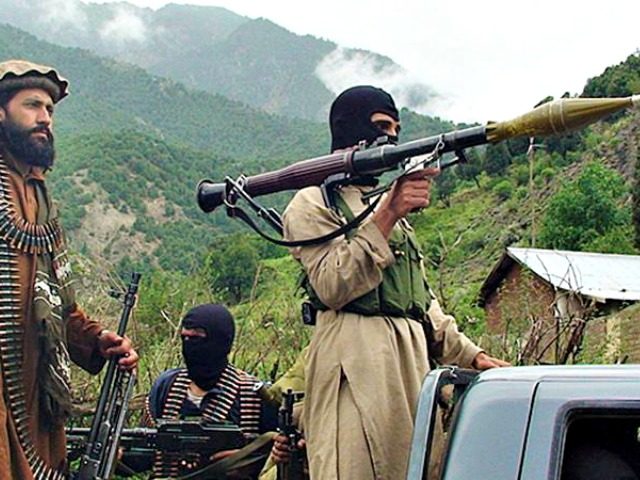The editorial board of Chinese state newspaper Global Times penned a piece blasting “India’s bigotry toward Pakistan,” a staunch Chinese ally, following Indian External Affairs Minister Sushma Swaraj’s speech at the United Nations General Assembly in New York.
“India’s bigotry toward Pakistan doesn’t match its much-vaunted ambition to be a world power,” the Global Times wrote. The publication went on to note, “There is indeed terrorism in Pakistan,” before suggesting, “It is politically imbecilic and unsophisticated for Indian elites to conclude that Pakistan exports terrorism. They should have seen the efforts and sacrifice that Pakistan has made to rid the world of terrorism and refrain from mixing disputes over terrorism with their own historical disputes.”
At least 32 designated terrorist groups operate out of Pakistan, including Tehreek-e-Taliban Pakistan (TTP), the Pakistani branch of the Taliban; Lashkar-e-Taiba (LeT); and Jaish-e-Mohammad Mujahideen (JeM), which is also known as the Army of the Prophet Mohammed.
The TTP’s aim is to overthrow Islamabad’s government and replace it with an Islamic caliphate in Pakistan. In August, the TTP published the first edition of a propaganda magazine which sought to persuade women to engage in jihad on the terrorist group’s behalf.
The LeT has known connections to Pakistan’s Inter-Services Intelligence (ISI), although the ISI has claimed that these ties were severed long ago. LeT was responsible for the November 2008 terror attack in Mumbai that took place over three days and left 150 dead and hundreds more wounded.
The United States has linked JeM to the death of Americans. Four terrorists affiliated with JeM — Salman Saquib, Fahad Naseem, Sheikh Adil, and Sheikh Omar Saeed — were found guilty of the 2002 abduction and beheading death of American noncombatant journalist Daniel Pearl.
China, which has repeatedly blocked an Indian resolution at the U.N. to declare JeM’s chief Masood Azhar an international terrorist, wrote in the Global Times that Indian media took “a veiled dig at China for blocking international efforts to blacklist Jaish-e-Mohammad chief Masood Azhar.”
In her address to the UNGA, Swaraj tore into Pakistan for harboring terrorists.
“India and Pakistan became free within hours of each other. Why is it that today India is a recognized IT superpower in the world, and Pakistan is recognized only as the pre-eminent export factory for terror?” Swaraj asked.
She added:
We established scientific and technical institutions which are the pride of the world. But what has Pakistan offered to the world and indeed to its own people apart from terrorism? We produced scholars, doctors, engineers. What have you produced? You have produced terrorists.
The Global Times accepted that Pakistan does have terrorism but asked, “Is supporting terror the country’s national policy? What can Pakistan gain from exporting terrorism? Money or honor? Is India really an IT superpower that produces engineers and doctors when it is hell-bent on believing Pakistan is evil?”
India, whose population is currently 1.3 billion people, produces approximately 1.5 million engineers annually. Pakistan, whose population is 193 million, produced 171,000 engineers in 2014.
Pakistan’s Ambassador to the U.N. Maleeha Lodhi hit back at Swaraj also, saying India was the “mother of terrorism” in South Asia and alleged that Swaraj “deliberately ignored the core issue” of Kashmir, which is part of Jammu and Kashmir, a contested border area between India and Pakistan.
At least six active Pakistani terrorist groups operate out of Kashmir.
Lodhi claimed:
India has sponsored and perpetrated terrorism and aggression against all its neighbors; creating terror groups; destabilizing and blockading neighbors to do its strategic bidding and sponsoring subversion, sabotage and terrorism in various parts of Pakistan. All this establishes that India is the mother of terrorism in South Asia.
The Chinese publication went on to write:
By inflaming nationalism in the Indian public, Indians become more determined to make India first than even US President Donald Trump’s “America First.” If they can’t reach this goal, the blame certainly belongs to others that care about their own interests and don’t do exactly as India wants.
In its editorial piece, the Global Times went on to suggest that India has “no reason” to “disdain China, a stronger and better-organized country,” while insisting that “India should learn a lesson from the Doklam standoff and rid itself of incomprehensible smugness.”
The military confrontation in Bhutan between India and China began on June 16 and ended on August 28, when China sent its troops and construction workers to start unwarranted construction on the contested Doklam Plateau, causing the world to speculate that the two countries were on the brink of a major border war.
Adelle Nazarian is a politics and national security reporter for Breitbart News. Follow her on Facebook and Twitter.

COMMENTS
Please let us know if you're having issues with commenting.